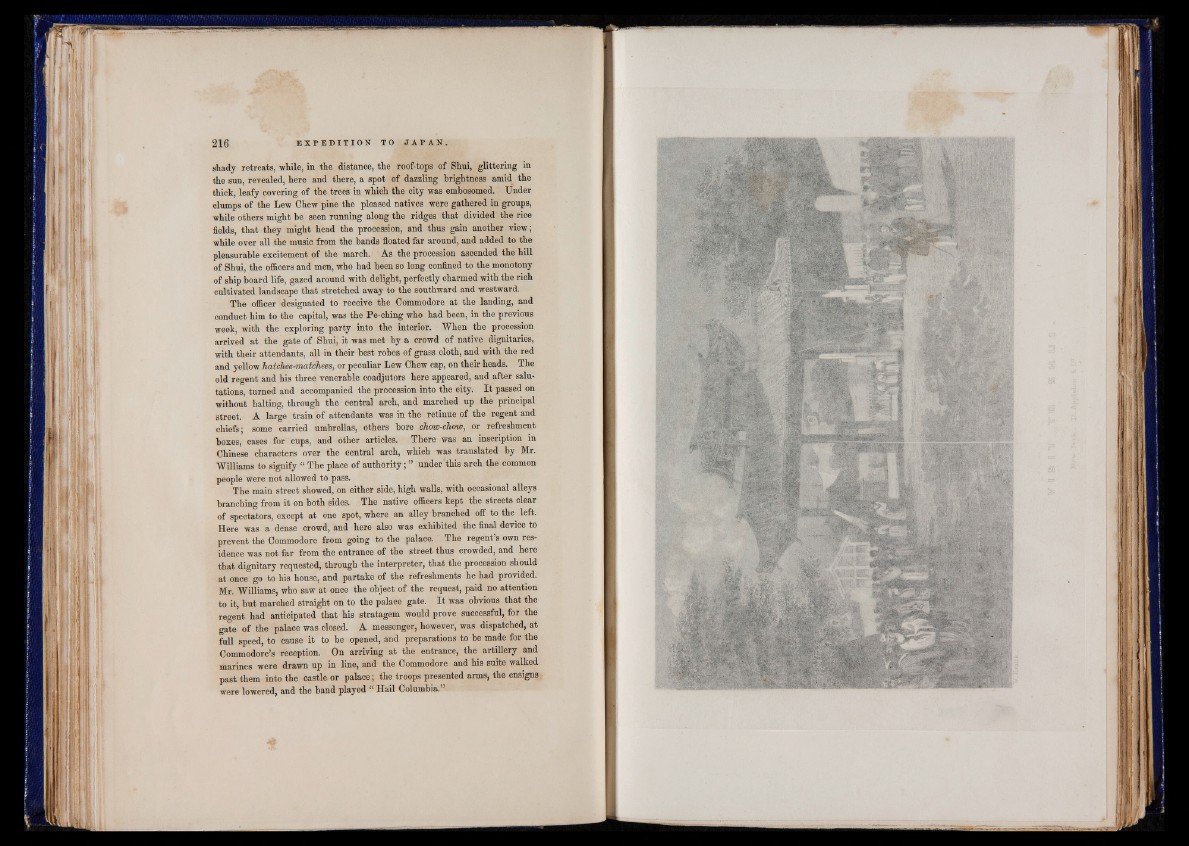
216 E X P E D I T I O N TO J A P A N .
shady retreats, while, in the distance, the roof-tops of Shui, glittering in
the snn, revealed, here and there, a spot of dazzling brightness amid the
thick, leafy eovering of the trees in which the city was embosomed. Under
clumps of the Lew Chew pine the pleased natives were gathered in groups,
while others might be seen running along the ridges that divided the riee
fields, that they might head the procession, and thus gain another view;
while over all the musio from the bands floated far around, and added to the
pleasurable excitement of the march. As the procession ascended the hill
of Shui, the officers and men, who had been so long confined to the monotony
of ship board life, gazed around with delight, perfectly charmed with the rich
cultivated landscape that stretched away to the southward and westward.
The officer designated to receive the Commodore at the landing, and
conduct him to the capital, was the Pe-ching who had been, in the previous
week, with the exploring party into the interior. When the procession
arrived at the gate of Shui, it was met by a crowd of native dignitaries,
with their attendants, all in their best robes of grass cloth, and with the red
and yellow hatchee-matchees, or peculiar Lew Chew cap, on their heads. The
old regent and his three venerable coadjutors here appeared, and after salutations,
turned and accompanied the procession into the city. I t passed on
without halting, through the central arch, and marched up the principal
street. A large train of attendants was in the retinue of the regent and
chiefs; some carried umbrellas, others bore chow-chow, or refreshment
boxes, cases for cups, and other articles. There was an inscription in
Chinese characters over the central arch, which was translated by Mr.
Williams to signify “ The place of authority; ” under'this arch the common
people were not allowed to pass.
The main street showed, on either side, high walls, with occasional alleys
branching from it on both sides. The native officers kept the streets clear
of spectators, except at one spot, where an alley branched off to the left.
Here was a dense crowd, and here also was exhibited the final device to
prevent the Commodore from going to the palace. The regent’s own residence
was not far from the entrance of the street thus crowded, and here
that dignitary requested, through the interpreter, that the procession should
at once go to his house, and partake of the refreshments he had provided.
Mr. Williams, who saw at once the object of the request, paid no attention
to it, but marched straight on to the palace gate. I t was obvious that the
regent had anticipated that his stratagem would prove successful, for the
gate of the palace was closed. A messenger, however, was dispatched, at
full speed, to cause it to be opened, and preparations to be made for the
Commodore’s reception. On arriving at the entrance, the artillery and
marines were drawn up in line, and the Commodore and his suite walked
past them into the castle or palace; the troops presented arms, the ensigns
were lowered, and the band played “ Hail Columbia.”